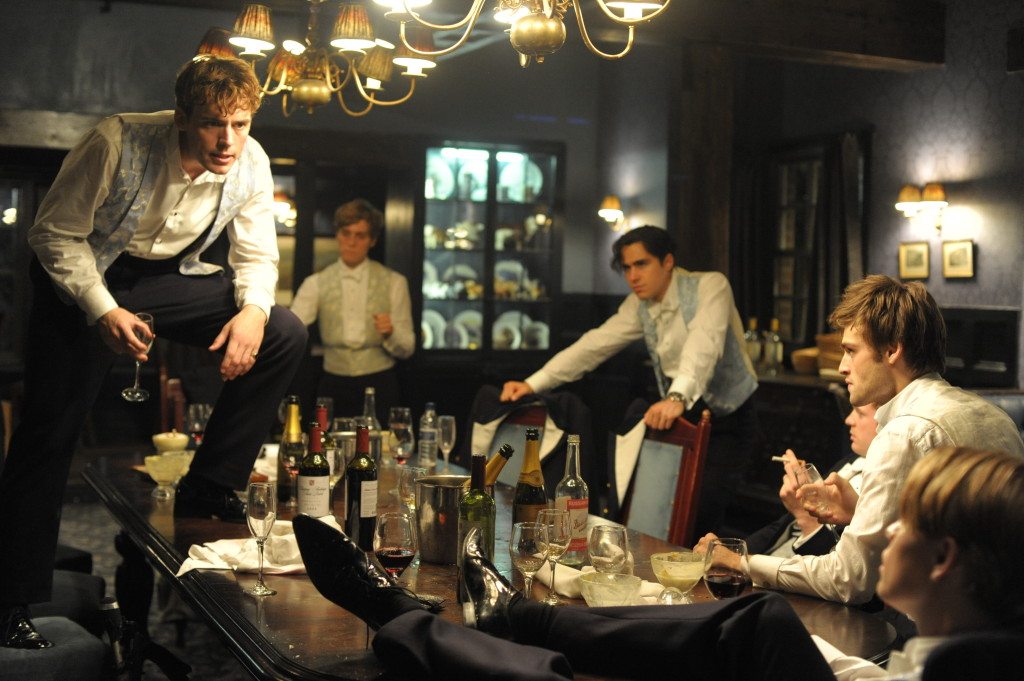The Riot Club
Director: Lone Scherfig
Cast: Max Irons, Sam Caflin
Length: 107 minutes
Country: UK
The Riot Club seems a difficult film to like. It’s dark, loud and brash, and the constant motifs of violence and destruction leave your stomach in knots. The humour is cringe comedy, the drama is as grotesquely fascinating as a slow-motion car crash, and the script’s anti-elitist rhetoric makes you squirm even more if you happen to know that the eponymous club has a real-world counterpart and that Boris Johnson, David Cameron and several other prominent politicians were all in it. Watching The Riot Club is an uncomfortable experience from beginning to end, but that doesn’t mean you shouldn’t watch it.
The Riot Club is a kaleidoscopic insight into the lives of ten obscenely privileged Oxford scholars, bound together by membership of the aristocratic ‘Riot Club’. Founded in the 1700s, the Riot Club is a remnant of the near-extinct social elite to which all of the boys belong, upholding the values of hedonism, exclusiveness and the all-pervasive power of money. But now they are independent young men, rife with all the frustrations and insecurities of any other students their age, discovering that cash can’t eradicate every problem, which leaves them feeling vulnerable when things stop going their way. Eventually they have an epiphany: they are being persecuted by poor people, and this is the cause of all their problems.
These boys are over-dogs who think they are underdogs and the club is a place for them to retreat into, away from a society that no longer respects nobility or rank. The film is essentially the artful bursting of the bubble which surrounds these men, or at least bursting it temporarily, when they are suddenly thrust into an environment where wealth and an old boys’ connection won’t protect them. For instance, the film demonstrates the Club’s sexist and racist attitudes but does not reflect them, and the boys’ prejudices are highlighted many times as being childishly out of touch and insufficient for negotiating with real women.
They are independent young men, rife with all the frustrations and insecurities of any other students their age, discovering that cash can’t eradicate every problem, which leaves them feeling vulnerable when things stop going their way. Eventually they have an epiphany: they are being persecuted by poor people, and this is the cause of all their problems.
The film was adapted from Laura Wade’s play, Posh, and its roots in theatre show very close to the surface at various points. The constrained setting is a dead giveaway, and the sense of time also seems inherited from the source material; the film goes by incredibly quickly and much of it in real time, so it seems a lot shorter than its credited two hours. The costumes are canny, though the boys’ identical blazers make them tough to tell apart, and the actors have to work that little bit harder to stand out in such a homogenous social setting. Happily, the acting is excellent, with particular props going to Sam Claflin for his portrayal of Alistair Ryle.
Alistair doesn’t appear a villain at first. Meek and sheepish, we meet him in the company of his overbearing parents, humiliated by their aristocratic sense of entitlement as they shout for better accommodation. Ryle manifests Al’s repressed malfeasance so gradually that you barely notice, but he grows progressively deranged, becoming more and more insistent that everyone must love him as his behaviour gets increasingly repugnant. It is at this point that the humour melts away from the second act, and concentrates on delivering through Alistair its great political beef.
But is the whole as great as the sum of its parts? You could call The Riot Club just a neat retelling of the old tale, class ivisions cost lives, without much of a new spin except for heavy use of smartphones and some self-conscious references to the Crash. It’s entertaining, edge-of-your-seat and engaging throughout, but personally I feel it lacks substance. Following these boys feels a little voyeuristic, as if we’re supposed to take as much pleasure as they do in the debauchery, and the film offers no solutions to the problems it poses. The issues themselves feel like thrown shadows, almost cartoonishly simple, and I can’t help thinking the overblown portrayal of the club undermines the insidiousness of privilege and the old boys’ network in society today. That’s not to say it isn’t good. See the film for the spectacle, the acting, the storytelling, or the suspense, just not for political commentary.
Image source: UPI media


Comments